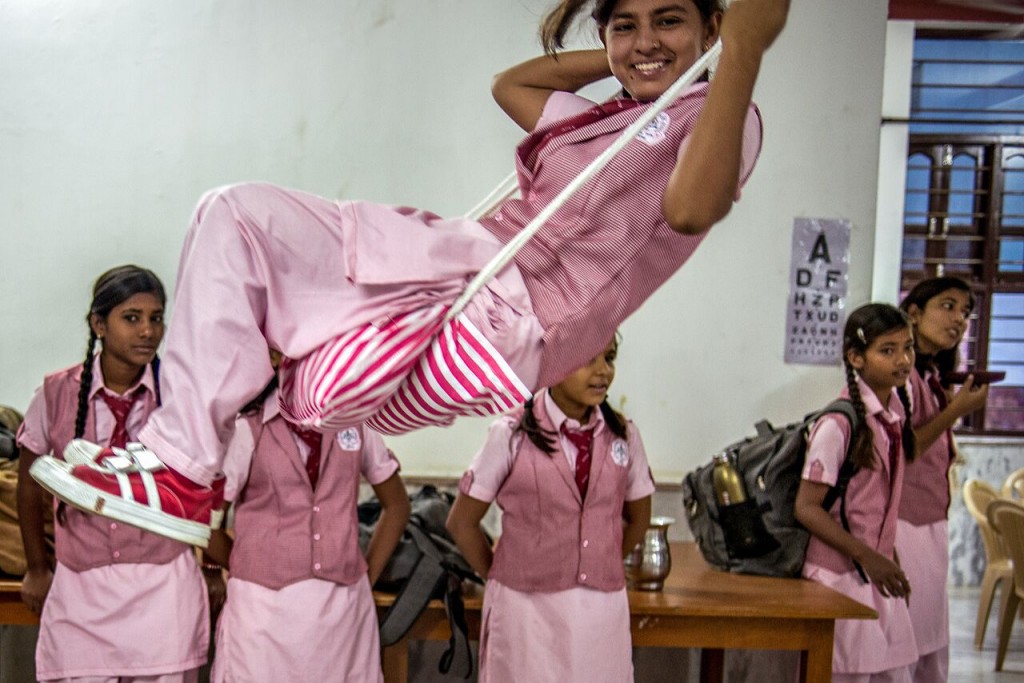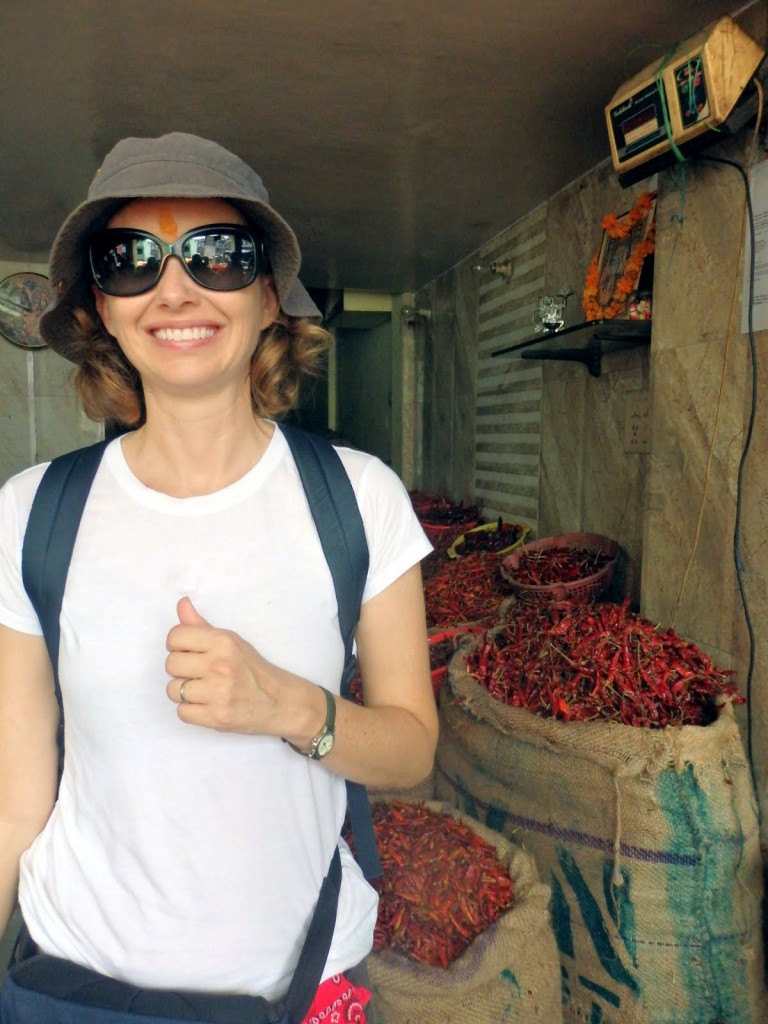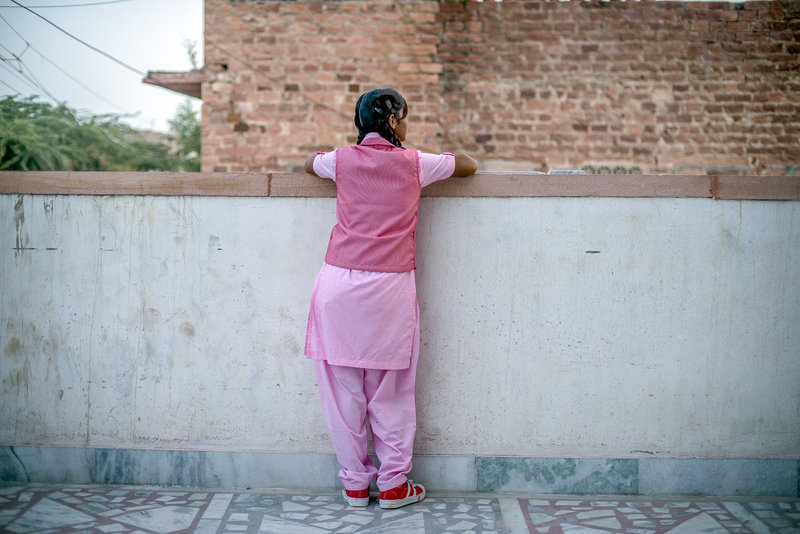
Many girls at the Veerni boarding school in India are child brides. (Credit: Poulomi Basu/VII Photo for NPR)
DURING THE MONTH OF OCTOBER, NPR has aired a new series called #15Girls. Composed of stand-alone episodes that feature teenage girls in different areas of the world, the series takes girls’ stories and uses them to illustrate the struggles girls that age face in their respective countries, and how those girls are trying to change their futures. These stories are especially poignant; in School For Child Brides, Nimmu, a 15-year-old girl Indian girl, shares the daily stresses of living at a boarding school, where she must get good grades and pass tests so she won’t be forced to leave school and live with the husband she was married to at age ten. NPR’s Vikki Valentine produced this story, and is the lead editor of the #15Girls series. Valentine spoke with Lady Clever about the inspiration for the series, what we didn’t get to hear from Nimmu, and why sharing the stories of these young girls is so important.
What was the inspiration behind #15Girls?
We knew we wanted to do something around teens – because there is this idea that by looking at the obstacles teens face and seeing what their options are, you can get a good idea of how a country or culture is doing. For instance, in Central America, huge numbers of teens and kids are trying to escape their countries. Kelly McEvers’ and Jasmine Garsd’s piece on El Salvador shows you why.
We had a big debate inside the team about whether to focus on girls and boys… or just girls. We decided to go with girls, because sadly, in many places they still face so much discrimination, and we wanted to find girls who were trying to change that. I would say one of our inspirations was also an incredible story by Planet Money’s Zoe Chace and Caitlin Kenney about two sisters. The sisters probably aren’t more than five years apart in age but are in very different situations because of the rapid rise of the manufacturing industry in their country. So through their lives, we learn about a lot about what’s happening in Bangladesh.
[For a fascinating look at how the majority of the world’s clothes are manufactured, check out the award-winning Planet Money T-shirt Project.]
Why did you focus on the age 15? Why is it important for girls this age to have their stories told?
In the U.S., we talk about sixteen as an important age for girls — “Sweet Sixteen.” But when you look at poorer countries, you find that the transition to adult starts a lot earlier than it does in the U.S. There are places, like Malawi, where girls have no adolescence at all. One day, they’re considered a kid, the next day an adult. That said, we found that 15 is an important age in a lot of countries. It can be a make-or-break year. Girls are old enough at that point that they’re really starting to think about their futures and what their options are, but not so old, like 17 or 18, when their fate is already set. (Yes, by 17 or 18 in some places, your parents have already settled your life for you). In India, for instance, it’s around age 15 when you take an important national exam – if you pass, you get to stay in school. If you fail, you don’t get to go to the next level. You can re-take the test though and try again. And that’s what Nimmu is up against right now. It’s also the age in some parts of rural India where girls are sent to live with their husbands. They may have been married at age ten (illegally), but they don’t actually get sent to live with their husband until they’re older.
How did you choose your topics and your subjects for the series?
We searched around for the main issues girls face in the developing world. Access to school is probably one of the biggest issues. Boys are more likely to go to high school or finish high school than girls. In some places, like parts of rural India, it’s because parents really do think girls aren’t worth investing in.
Can you share a little something about Nimmu we might not have heard in the piece? She’s obviously ambitious and intelligent, but must feel the stress of her current situation and pressure to study. Does she have any of joys we would consider “normal” for a 15-year-old?
Nimmu and her roommates and the girls at that school have incredibly long, hard days. They’re up at 4 a.m. (70 girls competing for the bathroom), and they’re in school for ten hours a day. They get one day off – Sunday – and on their day off they do chores like their laundry. They don’t get to go home or see their families much, and they do miss their families. And yet these girls are laughing and telling jokes all the time. None of the girls we met seemed sad or depressed. They were up for the challenge and had great friendships. We sat in on some of Nimmu’s afternoon classes, and her English teacher was great and the whole class was engaged and laughing. (Though the chemistry teacher was truly horrible). Here is something we couldn’t get into the piece about Nimmu, which I think a lot of girls who have sisters can relate to. Nimmu is the middle sister, and she told us what would make her happy is if she could have her father all to herself! Also, both Nimmu and Durga told us that their father was their best friend. Now those are some lucky girls.
Were Nimmu and her father both willing to participate from the beginning?
Yes! On our first day in Jodhpur, we met with a group of 15-year-old girls. And it was clear right away that Nimmu was our star. She had a lot to say. Her father, Lumbaram, also really wanted to participate. He only gets one day off work a month, and he offered to take that day to meet with us. We begged him to please not do that, that we could meet in the evening, we would work around his schedule. But he did it anyway — that’s how important this issue is for him. Lumbaram is a remarkable man, and he truly feels bad for having to break the law and marry his three daughters so early. And ever since the day of their marriage, it’s clear that he is trying to make it up to them. He told us he supported entirely his eldest daughter breaking her marriage (her husband is much older than she is and not very educated), even though he will have to pay what is an enormous amount of money for a laborer to the village council. (Yes, he has to pay a penalty for breaking the marriage, even though it was illegal to marry her so young). And he actively works with Veerni [the institute where Nimmu attends school] to get as many girls in his village to school as possible. We saw this with our own eyes. Some villages run Veerni out of town, they’re so opposed to anyone meddling in their affairs. But in Lumbaram’s village, he has worked to convince many parents there to delay sending their girls to their in-laws and to send them to high school instead.
Nimmu’s room-mates were also very willing to talk with us. One of the most surprising things: we asked a lot the girls we met in India what kind of job they would like, and many of them said “cop.” Because for them, if you’re a cop, no one can push you around. You get to be in charge and control of your own life. And that’s what all of these girls wanted… a say in their life.
How has editing this series affected you?
The one thing I learned is that it only takes a little bit to make a profound difference in someone’s life. The yearly cost to send a girl to school in India is chump change to an American — yet you change a girl’s life. Veerni’s entire budget to educate 70 girls every year equals the annual salary of an NPR reporter. (And NPR is a nonprofit, so while our salaries are good, they’re not national network salaries). That’s incredible. So while my job as a journalist is to describe the world, I’ve seen how one person, or a little bit of money, can make a big difference in the lives of others. That said, as a journalist I’m also aware that not all charities are created equal and some are scams. But there were times during the research, reporting, and editing of this series where I wondered if my life wouldn’t be better spent teaching school… whether in an American inner-city or in a place like India. I’m not saying India needs my or any help — that country is incredible! But I do think there are girls like Nimmu and her roommates, here, everywhere,that could use some help.
Have you kept in touch with Nimmu or any of the other girls from the #15Girls series? Are there any updates on their stories?
As many of the girls as we can, we plan on keeping in touch with to see how their lives turn out. Especially Nimmu, to see if she passes her national exam this March. Though I’m pretty sure she will. 😉
Tune into Nimmu’s inspiring story here, and don’t forget to listen to the rest of the eye-opening #15Girls series.



















